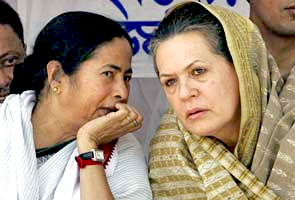 New Delhi, Nov 18: The Congress’s international conference on Jawaharlal Nehru on Monday turned out to be a get-together for its erstwhile allies.
New Delhi, Nov 18: The Congress’s international conference on Jawaharlal Nehru on Monday turned out to be a get-together for its erstwhile allies.
Many former partners of the Congress-led United Progressive Alliance (UPA) insisted that the meeting should not be construed as the beginning of a new alliance. But the fact that a majority of the parties opposed to the Bharatiya Janata Party (BJP) were under one roof was not to be overlooked.
The Congress efforts also come in the wake of a successful experiment in the recent by-elections in Bihar, where it had joined hands with anti-BJP parties to stop the Modi juggernaut that had started rolling with the Lok Sabha elections.
West Bengal Chief Minister Mamata Banerjee grabbed all the attention just before the start of the conference as she walked in to occupy the seat marked for her near CPM leader Sitaram Yechury.
As the arch-rivals exchanged pleasantries, Janata Dal (United) leader Sharad Yadav joined them soon, occupying the seat in between.
Also seated in the audience were one-time allies and supporters of the UPA, including CPM general secretary Prakash Karat, Janata Dal (Secular) chief and former prime minister H D Deve Gowda and Rashtriya Lok Dal chief Ajit Singh.
Prakash Karat was seated with Congress vice-president Rahul Gandhi and Deve Gowda.
Rashtriya Janata Dal chief Lalu Prasad had sent his lieutenant Jayprakash Narayan Yadav. Nationalist Congress Party chief Sharad Pawar had deputed party general secretary D P Tripathi. CPI national secretary D Raja was also present.
However, the Samajwadi Party, the Bahujan Samaj Party, the AIADMK and the DMK did not send their representatives.
Monday’s meet also comes in the backdrop of regrouping of the splinter groups of the erstwhile Janata Dal to jointly take on the challenge posed by an aggressive Modi-led BJP, which is making inroads into their traditional strongholds of Uttar Pradesh and Bihar.
Announcing the conference last week, the Congress had made it clear that it was not inviting Prime Minister Narendra Modi, the BJP and its allies as it does not believe in the ideals espoused by Modi.
However, the Congress’ s attempts to project the gathering as an anti-BJP platform for secular parties also came a cropper. “We attended the conference to recognise Nehru's contribution to nation-building,” said the non-Congress leaders at the meet.
“It was a conference on Nehru; that's why I came. I cannot say anything about alliances right now,” said Banerjee, who had walked out of the Congress to found the Trinamool Congress. “Nothing more should be read into our participation,” said Karat when asked whether it was the beginning of a new anti-BJP grouping.
Congress leader M Veerappa Moily said the conference was “above politics.”





Comments
Add new comment